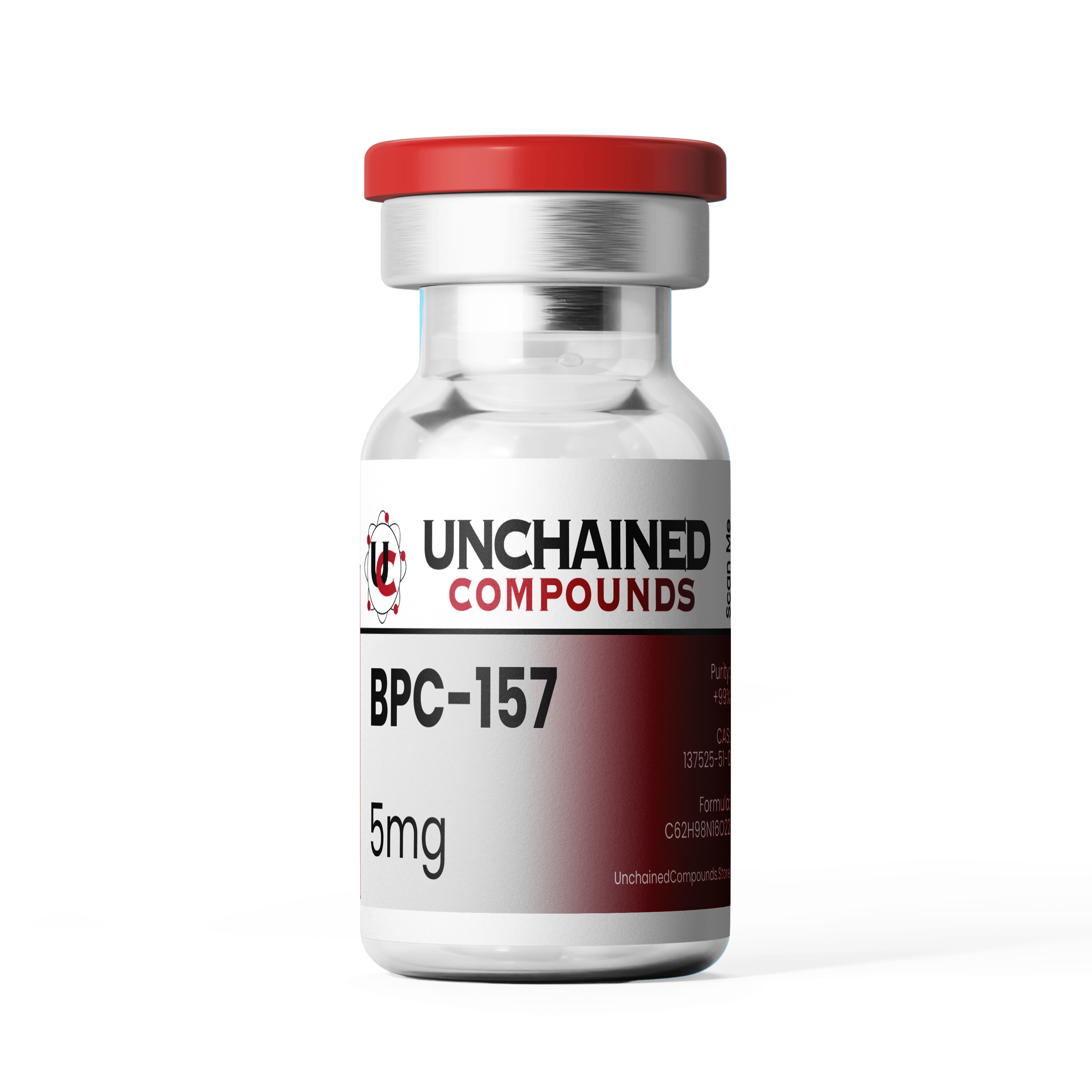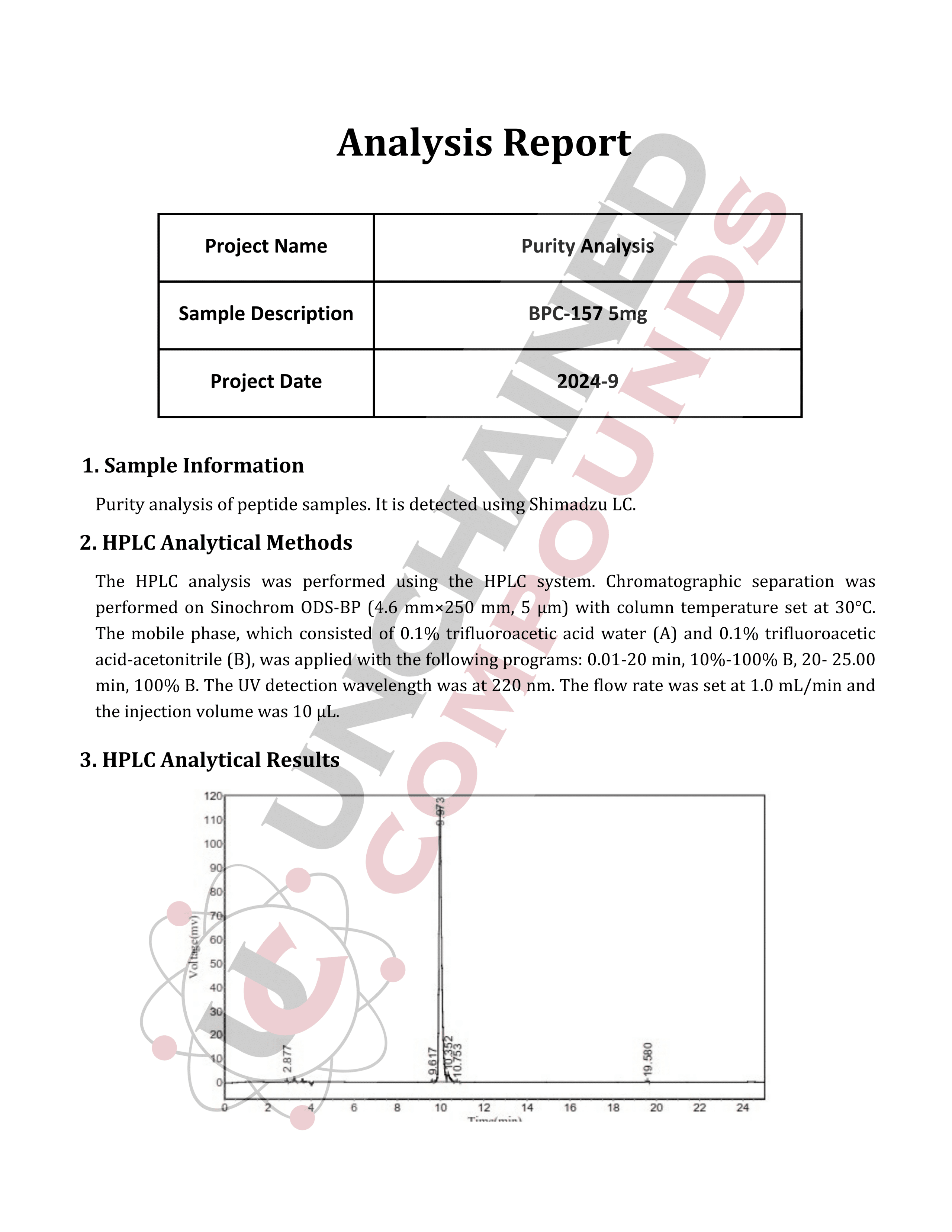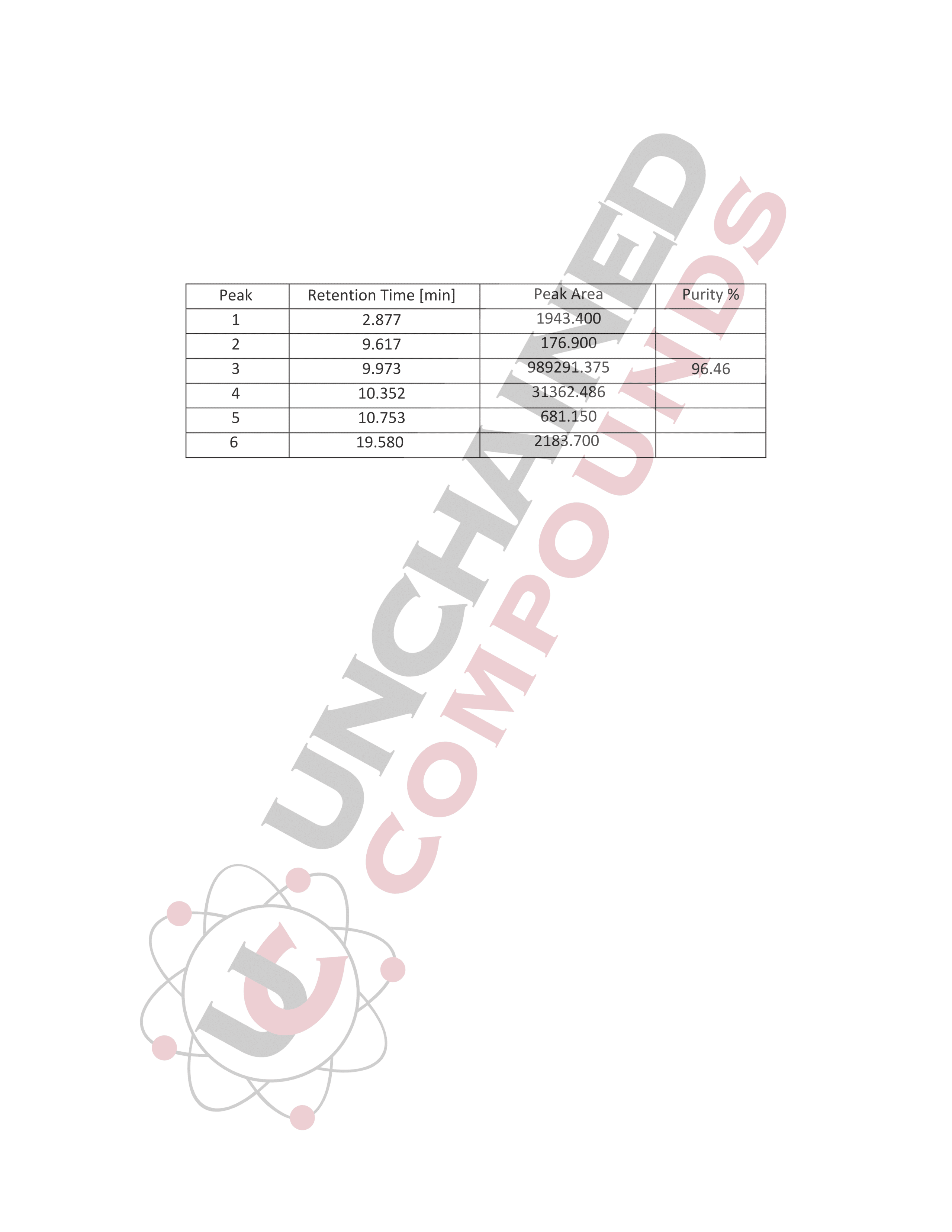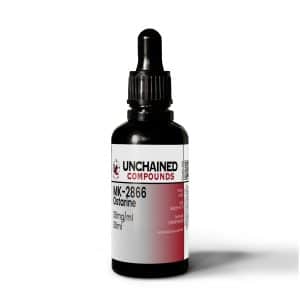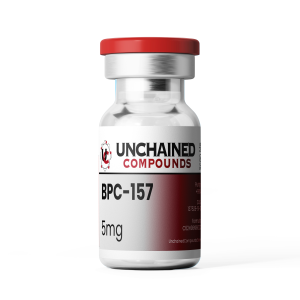Description

BPC-157 is a peptide chain derived from a naturally occurring protein in the human stomach. It is thought to interact with growth factors and cytokines, which are important signaling molecules that regulate cell growth, differentiation, and inflammation. It has been shown to stimulate the production of extracellular matrix proteins and promote the growth of new blood vessels, both essential in tissue repair and regeneration.
BPC-157 is currently being studied for its potential therapeutic effects on a variety of conditions, including gastrointestinal disorders, musculoskeletal injuries, and other inflammatory conditions.
Specifications
- Chemical Formula: C62H98N16O22
- Molecular Mass: 1419.5g/mol
- Synonyms: PL 14735
- CAS Number: 137525-51-0
- PubChem: 9941957
- Total Amount of the Active Ingredient: 5 mg (1 vial)
- Shelf Life: 36 months
Peer-Reviewed Studies
Modulatory effect of gastric pentadecapeptide BPC 157 on angiogenesis in muscle and tendon healing.
Abstract
Angiogenesis is a natural and complex process controlled by angiogenic and angiostatic molecules, with a central role in healing process. One of the most important modulating factors in angiogenesis is the vascular endothelial growth factor (VEGF). Pentadecapeptide BPC 157 promotes healing demonstrating particular angiogenic/angiomodulatory potential. We correlated the angiogenic effect of BPC 157 with VEGF expression using in vitro (cell culture) and in vivo (crushed muscle and transected muscle and tendon) models. Results revealed that there is no direct angiogenic effect of BPC 157 on cell cultures. On the other hand, immunohistochemical analysis of muscle and tendon healing using VEGF, CD34 and FVIII antibodies showed adequately modulated angiogenesis in BPC 157 treated animals, resulting in a more adequate healing. Therefore the angiogenic potential of BPC 157 seems to be closely related to the healing process in vivo with BPC 157 stimulating angiogenesis by up-regulating VEGF expression.
Abstract
The 15 amino acid agent BPC 157, showing a wide range of organoprotective action in different experimental models, was used in our experiments in order to establish its influence on different elements connected with the healing process. Elements thought to be of greatest importance in the process of healing are formation of granulation tissue, angiogenesis and production of collagen. In our work we tested the influence of BPC 157 on: granulation tissue and collagen formation, on angiogenesis as well as on tensile strength development, using three experimental rat models: 1) skin incisional wounds; 2) colon-colon anastomoses; and 3) angiogenesis model with synthetic sponge implantation. The specimens were histologically assessed for collagen, reticulin and blood vessels using scoring and morphometry. In all experiments significant differences between BPC 157-treated animals and controls were found, showing a strong, promoting involvement of BPC in the healing process. It is worth noting that these effects were achieved by different routes of application, including intragastric and local, making BPC 157 a potentially useful therapeutic agent.
Abstract
Commonly, the angiogenic growth factors signify healing. However, gastrointestinal ulceration is still poorly understood particularly with respect to a general pharmacological/pathophysiological role of various angiogenic growth factors implemented in growth factors wound healing concept. Thereby, we focused on the stable gastric pentadecapeptide BPC 157, a peptide given always alone vs. standard peptidergic angiogenic growth factors (EGF, FGF, VEGF), and numerous carriers. Further, we reviewed how the gastrointestinal tract healing could be generally perceived (i) in terms of angiogenic growth factors, and/or (ii) through the healing of extragastrointestinal tissues healing, such as tendon, ligament, muscle and bone, and vice versa. Respected were the beneficial effects obtained with free peptides or peptides with different carriers; EGF, FGF, VEGF, and BPC 157, their presentation along with injuries, and a healing commonality, providing their implementation in both gastrointestinal ulcer healing and tendon, ligament, muscle and bone healing. Only BPC 157 was consistently effective in all of the models of acute/chronic injury of esophagus, stomach, duodenum and lower gastrointestinal tract, intraperitoneally, per-orally or locally. Unlike bFGF-, EGF-, VEGF-gastrointestinal tract studies demonstrating improved healing, most of the studies on tendon, muscle and bone injuries provide evidence of their (increased) presentation along with the various procedures used to produce beneficial effects, compared to fewer studies in vitro, while in vivo healing has a limited number of studies, commonly limited to local application, diverse healing evidence with diverse carriers and delivery systems. Contrary to this, BPC 157 – using same regimens like in gastrointestinal healing studies – improves tendon, ligament and bone healing, accurately implementing its own angiogenic effect in the healing. Thus, we claim that just BPC 157 represents in practice a pharmacological and pathophysiological role of various peptidergic growth factors.
Disclaimer
The information provided above is not intended to substitute medical advice, diagnosis, or treatment. Should you have any questions regarding a medical condition, seek the advice of your physician or a qualified healthcare provider. In no case should medical advice be disregarded or delayed because of what you have read or seen. We bear no responsibility or liability for your use of any of our research compounds and products. Please note that they are being sold for research purposes ONLY. We do NOT condone any personal use.
NOTE: In some cases wherein the assigned top colors are out of stock, a different top color will be used to ensure that your order will not be delayed. Should you need assistance identifying the peptide vial that you received, please send us an email at support@unchainedcompounds.store
ALL ARTICLES AND PRODUCT INFORMATION PROVIDED ON THIS WEBSITE ARE FOR INFORMATIONAL AND EDUCATIONAL PURPOSES ONLY.
The products offered on this website are intended for in-vitro studies only. In-vitro studies (Latin: “in glass”) are performed outside the body. These products are not medicines or drugs and have not been approved by the FDA to prevent, treat, or cure any medical condition, ailment, or disease. Bodily introduction of any kind into humans or animals is strictly forbidden by law.


